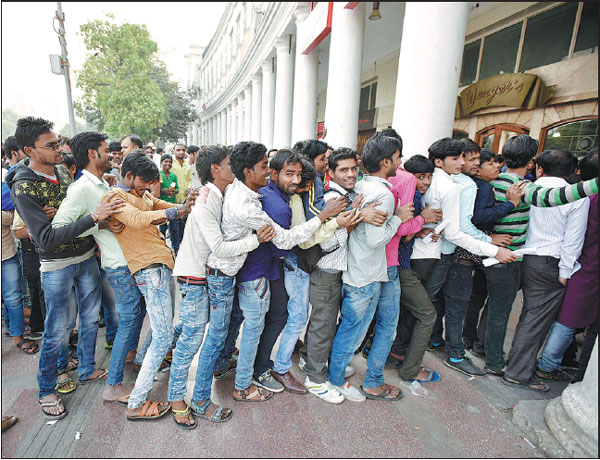Currency swap sparks frustration
People are growing skeptical that banknote crackdown will curtail use of 'blackmoney'
The first people showed up at the bank long before dawn, forming a line in the cold and the smog and silently waiting for the chance to withdraw their own money. They left more than seven hours later, each holding the handful of bills, worth $60 at the very most, that they'd been allowed to take home.
By midday, the lines snaked back and forth across the parking lot outside the Axis Bank branch in central New Delhi. Occasionally, a policeman carrying a long bamboo club would slap someone who stepped out of line.
"They keep telling us that that this is good, and maybe they're right," said Shahida Parveen, a 36-year-old woman whose family had almost no usable money left. "But I don't see anything good happening."
This is just one bank, in one city, in a country of 1.3 billion people, millions of them increasingly desperate for cash amid a chaotic government effort to crack down on corruption by banning high-denomination currency notes.
Ill-prepared
Last week, Prime Minister Narendra Modi announced in a surprise nighttime TV address that all 500 and 1,000 rupee notes, worth about $7.50 and $15, would be withdrawn immediately from circulation, a move designed to fight corruption and target people who have been dodging taxes by holding immense stockpiles of cash, known in India as "black money".
In a nation hobbled by corruption, and where less than 3 percent of people file tax returns, the plan at first earned widespread approval.
But as the days ticked by, it became increasingly clear that the government was ill-prepared for a plan that suddenly pulled 86 percent of the country's money supply out of circulation.
Families began hoarding small-denomination currency, merchants reported plummeting business and salaries went unpaid. Many businesses were refusing to accept the only new note rushed into circulation, worth 2,000 rupees, because they were unable to make change for it. The government says it's also trying to get new 500-rupee bills into circulation, but they remain rarities.
Modi acknowledged the transition to the new currency might be briefly difficult, but said the government "spent long hours trying to figure out how to minimize the inconvenience".
But in the parking lot outside the Axis Bank, customers were unconvinced.
"This is only to harass people like us," said Parveen, a stay-at-home mother whose husband works as a small-time broker for rental properties, but has had no work for the past week.
Hundreds of millions of Indians do not have bank accounts and use only cash. Many businesses only accept cash. "The people with all the black money, they'll find a way to manage," she added.
She's right. The price of gold spiked in the hours after Modi's announcement, as the rich looked for ways to get rid of their old currency. Accountants say there has been a surge in questions about laundering cash, with one saying a client had come in admitting he needed to get rid of more than $5 million in discontinued notes.
The government, meanwhile, insisted all was well.
The "public need not be anxious," said a weekend statement from India's national Reserve Bank. "Cash is available when they need it."
|
People line up outside a bank in New Delhi, India, on Tuesday, days after the government announced that 500 and 1,000 rupee notes will cease to be legal tender.Ravi Choudhary / Getty Images |



















